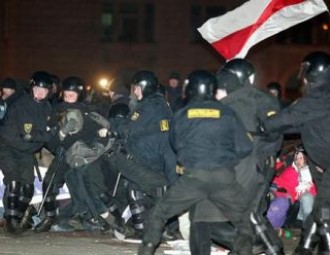Opinion: Belarus authorities won’t change their practices regardless of softened political rhetorics

The state hasn’t provided clear guidelines to the law enforcement to change their practices. De facto, the law enforcers are free to choose their mechanisms, which is likely to preserve for a while.
Last week, there were several reports that law enforcement officers had used force unlawfully and disproportionately, as well as non-lethal weapons in Belarus. For instance, they have beaten up a homeless person in Minsk and used special means (handcuffs) in Molodechno on street traders. These facts have confirmed the recent trend of disproportionate and unjustified use of force by the law enforcement. Some time ago, journalist Paval Dabravolski had been beaten up and more recently – opposition activist Viachaslau Siuchyk; social (non-political) activists had suffered from repression. In addition, public activists have been pressured before the anniversary of the Chernobyl disaster. Some analysts were quick to say that the liberalization of the notorious Belarusian regime had finished before it started.
It would be a mistake to link the practice of disproportionate and unjustified use of force by the police with political factors. Rather, Belarus faces a threat of systemic abuse by the authorities, which may affect any citizen, regardless of his/her political activity/passivity. The Belarusian authorities have softened their rhetoric, but have not bothered to alter the practices of the law enforcement, which is directly responsible for public safety and stability of the regime.
The law enforcement is unlikely to punish its pawns or publicly recognise their wrongdoing. Firstly, because the authorities regard ‘recognition of own errors’ as a recognition of their weakness. Secondly, each of these cases has sparked public outcry. The punishment of those responsible (eg the police officers) could set a precedent of people’s ability to influence the security sphere. And the authorities believe, this could be a ‘dangerous’ path in the view of economic recession. Thirdly, the punishment of the guilty could have a negative impact on the morale among the law enforcement staff, which, given the existing financial constraints is not very high anyway. Fourthly, the use of force is working for the authorities’ benefit and supports its credibility, and therefore it should not be punishable by definition.
Clearly, the Belarusian authorities have full control over the security forces in Belarus. The problem with excessive use of violence lies outside the national security sector, and is in the sphere of influence of the political authorities, who have not ordered the security forces to change their practices. Apparently, this was a conscious decision by the senior authorities in Belarus. The Belarusian authorities consider liberalisation, transparency and accountability of the public security agencies as a threat to the ability to control power bodies. Events in Ukraine have strengthened views among the Belarusian authorities that public recognition by the security forces of their flaws would only discredit the security forces in the eyes of the people, which, in turn, could destabilize the entire political system in Belarus.
-
03.01
-
07.10
-
22.09
-
17.08
-
12.08
-
30.09








































